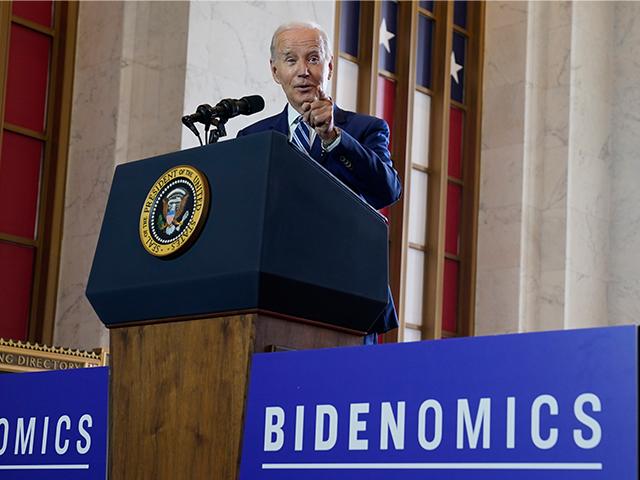Are We Helpless in the Face of Inflation?
Inflation is increasingly coming to resemble the old joke about the weather: everyone talks about it, but no one ever does anything about it.
Younger readers may not remember a time when weather was regarded as a natural phenomenon, an act of nature or God, outside of the control of human ingenuity. These days we fancy ourselves as weather-controlling wizards—although we typically refer to these as “climate change” policies rather than outright weather control.
Oddly enough, even as we have talked ourselves into the idea that we can use public policy to finely tune temperatures to avoid a few degrees increase over the course of decades, we are increasingly told that inflation is largely beyond our ability to manage through monetary or fiscal policy.
Biden Passes the Buck to Putin and Greed
The Biden administration has not yet admitted that it is utterly helpless in the face of inflation—although its utterances have that implication. Describing inflation as a result of “Putin’s price hikes” was primarily a combination of political buck-passing and a peculiar instance of the Russophobia that has infected American progressives with the idea that everything that bugs them is wired into the U.S. from Moscow. By stamping inflation as “Made in Moscow,” the administration suggested that rising prices were largely out of the reach of U.S. policy.
Biden’s more recent turn to the idea that inflation is caused by corporate greed is also primarily about deflecting blame for rising prices. And it also insinuates that the public should not expect much from the president on inflation because the real problem is the sin of greed that has been with us for all of recorded history (and no doubt earlier).
You are not supposed to notice that this is a very poor explanation for why inflation has increased. Did Biden make corporations greedier? What caused a greed explosion? Were corporations very greedy under President Jimmy Carter, the last time we had such a potent explosion of inflation? Did Ronald Reagan cure them of their greed, bringing inflation down to reasonable levels? Our view of history would have to be heavily revised if we think of greed as an economic and social variable rather than a constant.

President Joe Biden delivers a speech on “Bidenomics” on June 28, 2023, at the Old Post Office in Chicago. (AP Photo/Evan Vucci)
Some of Biden’s smarter supporters avoid such obvious ploys and instead attempt to absolve the Biden administration of any responsibility for inflation by pointing to the fact that many other countries also experienced inflation. Defenders of the Federal Reserve have also occasionally deployed this tactic: how can you blame Fed policy for inflation if economies overseen by the European Central Bank and the Bank of England also experienced high inflation?
The obvious problem with this dodge is that many European countries and central banks also adopted the combination of accommodative monetary policy and expansive deficit spending that led to inflation here at home. If everyone is wet because they refused to carry an umbrella, that’s hardly a defense of not carrying umbrellas.
For our purposes, however, this is of interest because it also implies a defenselessness in the face of inflation. If it’s everywhere, what can be done about it? On closer examination, these arguments that point to global inflation seem to describe inflation as an act of God or nature. It’s just weather. What are you going do?
There are hints of this helplessness in the pandemic inflation supply-siders, people who claim that inflation was almost entirely the result of supply chain challenges that resulted from the pandemic and lockdowns around the globe.
Some of these people have even gone so far as to argue that the Fed should explicitly not try to do anything about inflation because raising interest rates is unlikely to encourage investment in supply chain improvements and may exacerbate inflation by discouraging investments that could bring on more supply. Inconveniently for them, supply chains vastly improved while the Fed raised interest rates. Did higher rates improve supply? Maybe or maybe not, but they do not seem to have interfered with the recovery very much.
The View from the Fed
Federal Reserve officials outwardly claim that they really do believe they are firmly in control of the price level and can bring down inflation to two percent. But even as they have acknowledged that inflation started rising around six months after their last interest rate hike, they have steadfastly refused to even consider that the two things might be related. Inflation is just stubborn or sticky or more persistent than expected. Or the lags are longer than thought. Or something.
The Federal Open Market Committee meeting minutes released this week show that some doubt has crept into the minds of some Fed officials about the adequacy of the Fed’s interest rate policy as an inflation-fighting tactic. The minutes note that some officials are beginning to wonder if current policy is not as restrictive as they thought. Some are even beginning to wonder if rates might have to rise again to revive the disinflationary impulses that brought inflation down so effectively from the nine percent peak in 2022 to 3.4 percent in the most recent CPI report.
That wonder may begin to harden into determination sooner rather than later. The recent economic data suggest that after a month of “moderation” in April, growth is accelerating in May. Jobless claims have seen a steep decline over the past two weeks. The stock market is booming—and not just because apparently every company in America is ordering AI chips from Nvidia. The S&P Global PMI rose sharply in May, we learned Thursday, “signalling the fastest expansion for just over two years in May,” according to S&P economist Chris Williamson.
In other words, whatever lingering or lagging restrictiveness might have been weighing on the economy from the rate hikes of 2022 and 2023 has quietly scampered off into the pages of history.
One of theses days, the Fed is likely to realize that the time for talking about inflation coming down has passed and the time for action to bring inflation down has returned.

COMMENTS
Please let us know if you're having issues with commenting.